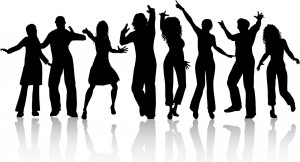
December 17, 2011, by Stephen Mumford
Dancing
Why dance? A sociobiologist might say it’s a mating ritual. Many people indeed find partners at discotheques, we have to grant that. But is such an explanation all too reductionist? Children like to dance, happily married people and even your granny will have a go. I doubt that it is all about gaining a reproductive advantage.
Put on your favourite pop record. Get up and move your body in time to the music. Isn’t it fun? It’s a great feeling. And isn’t that why we do it? There is great joy in moving your body. We are embodied beings – we live – and it is such fun to celebrate our embodiment.
I have been working on a philosophical theory over the past few years which states that it is pleasurable to exercise our own causal powers as agents. By our causal powers I mean abilities, skills and such like. Dance seems to offer an exemplary illustration. We do it because we can. It’s fun. And the more skilled the dancer, the more pleasure they get in the dancing. They can gain satisfaction in mastery of their body, never missing the beat, never putting a foot wrong. When humans dance, it may have no point at all. Sure, the pulse may raise, and that may be healthy, but for the most part we are not dancing for the fitness. It is pleasurable to feel one’s heart beat faster through dance. And we also take pleasure in seeing others take pleasure in their embodied agency.
faster through dance. And we also take pleasure in seeing others take pleasure in their embodied agency.
The thesis that it is pleasurable to exercise a causal power such as an ability may face objections. I seem to have the power to strangle someone, for instance, or to hammer a nail through my hand, but I wouldn’t find pleasure in doing so. I’ll just say that I’m working on the reply to that objection. I’ll get back to you. Now get up and dance!

My objection would not be the same as yours – I believe that the exercise of those causal powers does in fact cause a form of pleasure, but other factors cause equal or greater displeasure. However, I can’t agree with you that to dance is to exercise that power (or, to exercise it with intent and consciousness of doing so). So much of dance is about subsuming one’s autonomy – to the beat, to the crowd, to unconscious movement – that I can’t see how it relates to embodied agency. I am unsure if it is possible to have a non-reflective pleasure in embodied agency without nullifying that agency – is it not paradoxical? Obviously some dance is highly technical and requires concentration and reflection, but that is a refinement of the basic principles of dancing, rather than a root cause of them.
how. i like it my name is tadhi i come from tanzania i”m a dancer of michael jackson i need to be a together in your group
Ok, here you go. I will (hopefully) start off the replies. I love to dance. I love to dance most to the music that I love most. I bet I’m not alone in this. I experience a range of different kinds of pleasure from dancing. There’s the pleasure of the sheer exertion of it, as you say. But when I dance to reggae, for example, there is also the specific physical pleasure of amplifying, via the movement of my body, the underlying rhythm of life that is a heartbeat. Since reggae is heartbeat-music, after all. There are specific physical pleasures associated with other genres of music, too. Some sounds are erotic. Those, I venture, are up there with heartbeats, as pleasurable to express bodily. There is also the visual pleasure of aesthetically successful movement, as you say. I love to see others dance. And then there is the pleasure of sharing energy with another, and also of passing it back and forth. You can dance with someone in the same way that you can sing harmony with them, or make non-vocal music with them. Thus – as is always the problem with utilitarianism – “pleasure” is too general a term. But more than this. Music, to which dance is so closely connected, itself carries so very many meanings. Some music carries the meaning “Yes!”; other music “No!” Or: “Don’t give up!”; or “I’m really happy!”; or “Fu@% you!”; or “My soul belongs to God”; or “The world is infinitely delicate”; or “Mmmm, I like that.” As a result, the movements that express those meanings are, in an important sense, very different *kinds* of embodied agency, one from the other. It’s not clear that there is one set of aesthetic criteria to cover them all. All of which is to say: yes. There are few things as good as dancing, let alone dancing with someone you like to dance with. This is on a list of things that are true. But what’s so interesting is that underneath that general thought there is all manner of compelling particularity to be found.
i am verry poor femaly bt i in tirest daec giv help